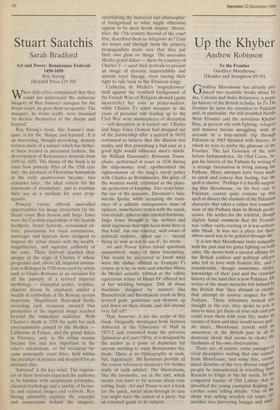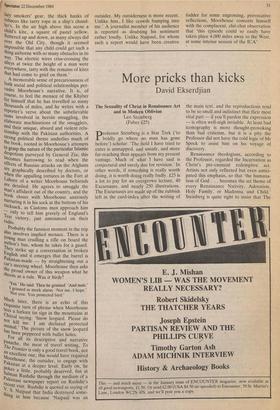Up the Khyber
Andrew Robinson
Geoffrey Moorhouse has already pro- duced two readable books about In- dia, Calcutta and India Britannica, a popu- lar history of the British in India. In To The Frontier he turns his attention to Pakistan and, in particular, the still troubled North- West Frontier and the notorious Khyber Pass, at present rife with fighting, refugees and massive heroin smuggling, with an account of a four-month trip through Pakistan in 1983 blended with history, in which he tries to probe the glamour of the Frontier. The last Govenor of the area before Independence, Sir Olaf Caroe, be- gan his history of the Pathans by writing of 'a strange fascination in living among the Pathans. Many attempts have been made to catch and convey that feeling, but the spell is elusive.' Perhaps it is hardly surpris- ing that Moorhouse, on his first visit to Pakistan, cannot quite conjure up that spell or dissect the element of the Pakistani character that takes a rather less romantic view of the Pathans than its British prede- cessor. He settles for the truthful, though slightly banal comment that the Frontier was 'either vastly exciting or it was unbear- ably bleak. It was not a place for those, whose need was to be gentled through life.'
It is not that Moorhouse lacks sympathy with the past and the gutsy fighting on both sides. He shows both a natural affinity for the British soldiers and political officers who fell in love with frontier life, and a considerable, though sometimes shakY, knowledge of their past and the crowded history of the land that is now Pakistan. Fie writes of the many memoirs left behind by the British that 'they abound in clichés that attempt to convey respect for the Pathans. 'These tribesmen looked You straight in the eye; they spoke to you as man to man; get them on your side and you could trust them with your life; make all, enemy of them and they would never quit.' At times, Moorhouse travels with an awareness of the British past in all its domestic detail that seems to choke the freshness of his own observations. There are, of course, some passages of vivid descriptive writing that one expects from Moorhouse, and some fine, econo- mical sketches of the very diverse range °I people he encountered in travelling from Karachi to Gilgit in the far north. In the congested bazaar of Old Lahore that s° absorbed the young journalist Kipling, he catches some telling details: 'One of the shops was selling wooden rat traps; Yet another was purveying huqqas and ancIr lary smokers' gear, the thick hanks of tobacco like tarry rope in a ship's chand- ler's. In the air high above this scene a Child's kite, a square of pastel yellow, fluttered up and down, as many always did over the Old City, though it seemed impossible that any child could get such a thing airborne with so many obstacles in its Way. The electric wires criss-crossing the alleys at twice the height of a man were everywhere, tatty with the remains of kites that had come to grief on them.' A memorable sense of precariousness of both social and political relationships per- vades Moorhouse's narrative. It is, of Course, to feel the menace of the Khyber for himself that he has travelled so many thousands of miles, and he writes with a reporter's verve about the unbelievable sums involved in heroin smuggling, the elaborate machinations of the smugglers, and their unique, absurd and violent rela- tionship with the Pakistan authorities. A strong political theme underlies much of the book, rooted in Moorhouse's attempts to grasp the nature of the particular Islamic despotism purveyed by General Zia; this becomes harrowing to read when the effects of Russian attacks on the Afghans are graphically described by doctors, or When the appalling tortures in the Fort at Lahore of a writer Moorhouse befriends are detailed. He agrees to smuggle the Man's affidavit out of the country, and the book closes with Moorhouse anxiously nurturing it in his sock at the bottom of his rucksack, as Customs men approach him
only to tell him gravely of England's Test victory, just announced on their radio.
Probably the funniest moment in the trip also involves implied menace. There is a Young man cradling a rifle on board the author's bus, whom he takes for a guard. They strike up a conversation in broken E-nglish and it emerges that the barrel is Pakistan-made — by straightening out a ear's steering wheel. Moorhouse then asks the proud owner of this weapon what he shoots as a rule. Was it birds?
`Yes.' He said. Then he grinned. 'And man.' I grinned in mock alarm. 'Not me, I hope.' 'Not you. You protected bird.'
Much later, there is an echo of this ._exquisite turn of phrase when Moorhouse Sees a forlorn tin sign in the mountains at Chitral saying: 'Snow leopard. Please do not kill me. I am declared protected animal.' The picture of the snow leopard has been peppered with bullet holes. For all its descriptive and narrative Panache, the meat of travel writing, To The Frontier is only a good travel book, not an excellent one; this would have required Moorhouse, the outsider, to engage with Pakistan at a deeper level. Early on, he Pokes a little, probably deserved, fun at
Pakistani Rushdie through the medium of a
Pakistani newspaper report on Rushdie's recent visit. Rushdie is quoted as saying of S. Naipul that India destroyed some- "ung in hima because 'Naipaul was an
outsider. My outsiderness is more recent. Unlike him, I like crowds bumping into me.' A journalist member of his audience is reported as doubting his sentiment rather loudly. Unlike Naipaul, for whom such a report would have been .creative fodder for some engrossing, provocative reflections, Moorhouse contents himself with the complacent, chit-chat observation that 'this episode could so easily have taken place 4,000 miles away to the West, at some intense session of the ICA'.







































































 Previous page
Previous page